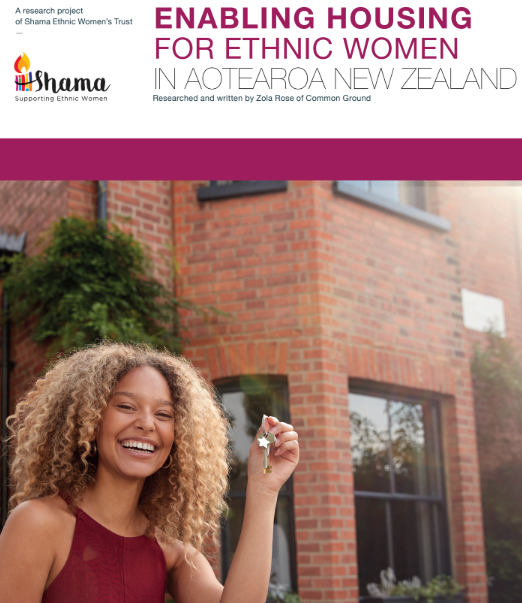Shama Ethnic Women’s Trust Research: Enabling Housing for Ethnic Women in Aotearoa New Zealand
CEWH highlights the report Enabling Housing for Ethnic Women in Aotearoa New Zealand, undertaken by Zola Rose of Common Ground on behalf of Shama Ethnic Women’s Trust and funded by Wel Energy Trust (October 2021 – July 2022).
While the research focuses on ethnic women in the Waikato - where Shama and Wel Energy Trust are based - the findings and recommendations are intended to be relevant for ethnic women across Aotearoa, taking into account regional differences and aiming to remove barriers to better housing outcomes.
The research explores the unique housing challenges faced by ethnic women in Aotearoa, including language and cultural barriers, reliance on a primary income earner, limited access to extended family support, discrimination, lower incomes, and difficulties accessing credit. These challenges exist alongside a national housing crisis marked by inadequate supply, rising costs, and low-quality homes, creating financial, emotional, and physical stress for women and their families.
As part of the research in the Waikato, an interactive Miro board activity was set up whereby women added virtual sticky notes in response to five questions, including: What words mean home to you? The answers included:
Family, rest, aroha, comfortable zone
A place where you and family can be yourself, feel safe and full of love
Warm and safe
Family, NZ, friends, love, community
Comfortable, safe and fun
Family, community, friends and safe
Hang out space, family comfort, belonging, food, my own space
Home means a place I can feel SAFE, WARM, CONNECTED. A sacred place
Feel relaxed, happy, enjoyable place, can invite friends and family, have get-togethers
Where I can feel safe with family, respected, happy, accepted
(Binh La) House with love
Home for me is the place where I feel safe and accepted
Enabling Housing for Ethnic Women in Aotearoa New Zealand examines initiatives from around the world and identifies approaches that could be adapted to the New Zealand context to provide culturally appropriate, secure, and affordable housing. Some models explored include collective or community-led housing, such as cohousing, which can foster supportive environments but often require savings or equity. More accessible options are typically led by not-for-profit housing organisations, providing affordable, long-term rental housing with additional support. The research also highlights the potential of mixed-tenure, collaborative projects that combine the benefits of both approaches.
Read the full research report here.

